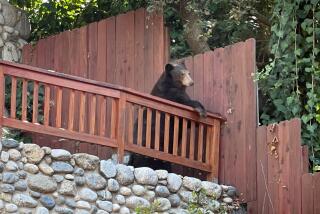Justices Uphold Ban on Ads by Religious Club at El Toro High
The state Supreme Court on Wednesday rejected a challenge to an Orange County school district’s refusal to permit members of a student religious club to advertise the group’s Bible study and prayer meetings on campus.
The justices, with one dissent, let stand a 2-1 ruling by a state Court of Appeal in Santa Ana last January upholding a ban by the Saddleback Valley Unified School District on functions or advertising by private, non-school groups “in any form.”
Only Justice Allen E. Broussard voted to review the appellate ruling. Votes from four of the seven justices are required to grant such a hearing.
Attorneys in the case said the dispute will probably now be taken to the U.S. Supreme Court. But if the appeal court ruling is not overturned, it will become binding on trial courts throughout the state.
Restrictions Defended
The district’s restrictions had been attacked as a violation of the right to free speech by two members of the Christian New Life group, who had sought unsuccessfully to distribute leaflets on the campus of El Toro High School and place the club’s ads in the school yearbook.
Lawyers for the two students, pointing out that members of the group had been allowed to meet informally during lunch hours on campus, argued that the district had no right to censor the club’s advertising.
Attorneys for the district defended the restrictions, arguing that school premises were not an “open forum” and that the prohibition on activity by non-school groups was permissible because it applied to both religious and non-religious organizations.
The district contended also that allowing religious groups to distribute leaflets on campus would imply an endorsement of such activity by school authorities, violating constitutional prohibitions against government establishment of religion.
“I must say we are pleased the (state) court declined to hear the case because we feel the Court of Appeal decision was a correct one,” said David C. Larsen of Costa Mesa, an attorney for the district.
“But we fully expect the issue to go to the (U.S.) Supreme Court. Whether that court will hear it is hard to say. Obviously, though, this is a case with a great deal of interest and is of significance to many people.”
Attorneys for the students were not available for comment.
Wednesday’s action may represent the end of a seven-year dispute in the district over religious proselytizing on school grounds. In 1981, the district allowed religious groups to meet on campus but later, in the face of a lawsuit by the American Civil Liberties Union challenging the practice, barred all gatherings by non-school groups.
Members of the New Life group then organized informal religious discussions on campus during the lunch hour, without objection by authorities. But when club members sought to distribute leaflets promoting the meetings and to place an ad in the yearbook, their requests were denied.
Filed Suit in 1985
The two students, Alexander Perumal and Frederick Read, brought suit in 1985 to challenge the district’s policy as discriminatory against religious free speech. But the restrictions were upheld by Orange County Superior Court Judge Philip E. Schwab.
The state Court of Appeal, in a ruling issued Jan. 29, affirmed Schwab’s decision, concluding that the district’s ban on activity by off-campus groups was permissible.
The policy, wrote Appellate Justice Sheila P. Sonenshine, “promotes the general well-being of the campus; because religious groups are not singled out for better or worse treatment, its principal or primary effect neither advances nor inhibits religion.”
Sonenshine’s opinion was joined by Appellate Justice Edward J. Wallin.
However, in a detailed and vigorous dissent, Appellate Justice Thomas F. Crosby Jr., criticized the decision as a “jarring invasion of fundamental liberties” that placed an improper “prior restraint” on free speech.
The panel, Crosby said, “manages to treat the free expression of high school students during recess and a section of the yearbook devoted to paid advertisements as an anathema equivalent to the distribution of drugs or obscenity on campus or the broadcast of ship departures of wartime.”
More to Read
Sign up for Essential California
The most important California stories and recommendations in your inbox every morning.
You may occasionally receive promotional content from the Los Angeles Times.










